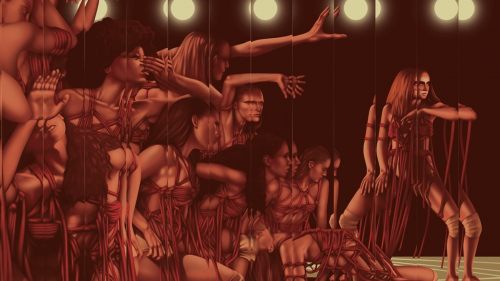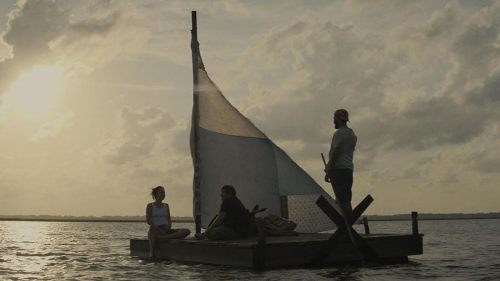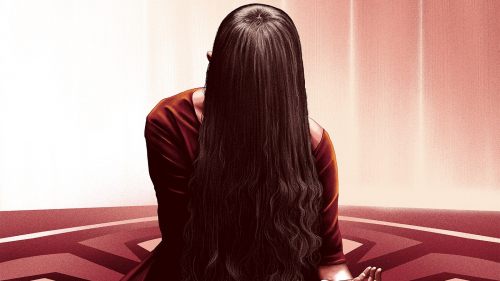The Two Suzys: Dakota Johnson And Jessica Harper On SUSPIRIA
Suspiria is out soon. Get your tickets here!
Forty-one years ago, Dario Argento released his horror masterpiece Suspiria. The film has remained culturally relevant since its release, frequently screening and being discussed among both genre enthusiasts and cinephiles. Remake rumors swirled for years – David Gordon Green was once attached – but it took Call Me By Your Name director Luca Guadagnino to actually get one off the ground. Both films follow a Suzy Bannion who enters a mysterious dance academy run by witches. In 1977, Suzy Bannion was embodied by the great Jessica Harper, who had just appeared in the soon-to-be cult classic Phantom of the Paradise. Guadagnino’s Suzy is danced brilliantly by Dakota Johnson, who appeared alongside her Suspiria costar Tilda Swinton in Guadagnino’s A Bigger Splash. In the latest Suspiria, Jessica Harper returns for a brief role towards the end of the film – but I won’t give the details away. In separate interviews, I spoke to the two actresses about the new Suspiria and their respective Suzy Bannions.
Luca Guadagnino has always been a filmmaker who frames the human body in a really bare and unique way. Do you share this sensibility? I feel like a lot of your work – particularly the Fifty Shades of Grey films and A Bigger Splash – feature women’s bodies as important factors in their aesthetics and narratives.
Dakota Johnson: I've always had a real love for the female body. When I was in high school I studied visual arts and I studied figure drawing so I was always drawing women, nude women, every day. I don't know, I think I have such a respect and love for bodies. I get excited when there are films that want to portray women the way that I see them. Preparing for the film unfolded from the moment that Luca and I talked about it when we were filming A Bigger Splash. It was from then until we started filming that I was preparing for this movie. So that was a couple of years of research and understanding of the vibe of the film, the politics of the film. Learning from the references that Luca had sent to me. I think the thing about women and the body in this movie is that it's a tool. It's a tool of expression and it's a symbol of feminine strength. The movement of bodies is a language in itself. What inhabits the body is energy and history.
Maternity seems to be very important in the film. Mothers are present in many ways. Suzy is haunted by thoughts of her own mother and the relationships between the dancers and their teachers is strangely maternal as well. Then of course we have the discussed “Three Mothers”…
It's a very twisted topic. It's a lot about manipulation and possession. We're all trying to survive our mother. Having this - however tumultuous it may be - relationship with your own mother. Then there's the mother that is you. Then there is, if you dare to access the ferocious energy and power that lies within Suzy, then she's the ultimate mother. It's interesting because it's also about thresholds. Suzy denounces her mother but there's also a sort of bizarre maternal relationship between Suzy and Madame Blanc, but perhaps it may be a bit loving. Not at all romantic or even sexual, but complicated. There are just so many levels to it, especially in regards to the maternal aspect. I can't even begin to touch on all of them.
This is the second film you’ve made with Luca Guadagnino and Tilda Swinton. They of course have been working together since 1999. Have you developed a particular language in the way you work together?
It's totally telepathic. I look across the room and I can make eye contact with Luca or Tilda and we are on the same page and it's fantastic. It's fun. It's a collective of people, it's the three of us but there's also a team behind the camera that is always the same people. It's a big family and there's a lot of history and stories on the other side of the camera as well as in front. It's sort of a seamless collaboration and understanding and respect. I feel really lucky. When I feel discouraged about the world, which is like multiple times a day right now, I feel even more grateful and lucky that I have found two people who I find to be the masters of their craft. They let me near them [laughs].
I understand that you did nearly all of your own dancing in the film. What was the preparation for that like?
Two months before we started filming there was a few weeks of intensive training and learning of the choreography. That was the time we were with the dancers all day. We did sort of create this dance collective. It was a legit dance company. The women are professional dancers, but for a lot of them it was the first time they were on a movie set. They also were so supportive and encouraging of me and Mia and they were so helpful. When there were days when we were filming dance sequences, one of them - I worked really closely with a couple. They would warm me up and we would do a workout. These women, their bodies are their craft, it's like a paintbrush. They pay such close attention, it's something that I knew a little bit of when I was growing up. I danced a bit, I did ballet, and I was on a little dance team for a little while, but it was nothing like this. When you're young you learn about technique and form but for these women it's about expression and it's so beautiful to me. Through Suzy I learned about that, then there's the side of me that is such an overachieving perfectionist that I was like strangling the time to make the dancing perfect. So there was a really fine line between me needing to get it right and also needing to inject Suzy's expression through my body. The collaboration with the other dancers was extremely helpful because I kind of got to see what each of their signatures was. If dance is the language then they all had different accents. It was just extraordinary.
One of the few obvious similarities between this Suspiria and the original film is that the name of your character has remained. Do you think there are similarities between them?
I think they're totally different and I think it all comes down to the way in which they absorb what's happening around them. I think Suzy is not worldly at all but she has this - when things occur around her, if she hears a bomb for the first time or sees a naked man for the first time, it's almost like she's thrown into a weird fit of glee instead of being shocked and scared. Fear is not something that she feels - if she feels fear she's excited by it and she feels like it feeds her. It almost makes me uncomfortable to compare the Suzy's because they're so different and the movies are so different. I love Jessica Harper as the first Suzy so much; I just feel that this movie is a completely different film than the other one.
I wanted to return to the discussion of bodies. The 1977 film depicted violence mostly through vast amounts of blood. This film on the other hand really focuses on the manipulation of the body in its murder scenes. What do you think of the way the film functions as body horror?
I think in a way it's almost more horrifying, because when you see gallons and gallons of blood in a horror film there's something very obvious and sort of expected about it. With this one, you see a body being mangled and you almost feel like, "Oh my god, maybe that could happen to me" and it becomes more personal because you have a body. The fact that the witches are women, it's the personal touch that makes it more eerie and more scary when you feel like it's real. When you feel like you've seen these women before, you've been here before. There's nothing totally outlandish. There's nothing like "Oh god, that couldn't happen."

How did you get involved with the remake? I remember your role being announced much later than the rest of the cast.
Jessica Harper: I heard about it a long time ago. As you may know there have been rumors about this for years and I sort of discounted them for the most part. Then I heard that Luca was attached and then I thought that it might actually get made and if it does it's going to be extremely interesting. I got very excited about it. They were pretty far down the line, they were getting ready to shoot, and Luca called me. He and David - the screenwriter - had been talking about finding me a role in the movie because they thought it would be fun and would draw people to the movie. Luca called me, which was so thrilling because I’m such a fan of his, and asked me if I wanted to do a cameo. He didn't even have to finish his sentence and I said, "Yes, of course. I would love to work with you." Then he said, "Can you do the part in German?" I said, "Of course I can, not a problem." I hung up and went right to the Berlin School of Languages and said, "I have to learn German right now." In fact, I lied to Luca, I didn't know how to speak German, but I figured it out.
Well the late-1970s Germany setting is really fascinating in the film. Its use is particular and adds a lot of depth to the film.
It's set in 1977. I love the fact that it's set in the year that the original Suspiria was released. Those kinds of details are always interesting. Also, of course, it allows the story to expand to have more layers and to echo what was going on politically at the time. It gives Suspiria's story a really interesting kind of depth and also a whole sort of feel and look that are very different from the original. It greatly expands the story and the aesthetic of the film.
Do you think the Suzy Bannion you played is similar to the new Suzy Bannion?
I think the characters are very similar. To be honest with you, when I saw the new version it made me think more about my original interpretation of Suzy and what was really going on with her. The new Suzy is embodied by Dakota Johnson in such a lovely performance. It seemed to be a character who might be in touch with or know about her incredible power when she arrives at the school. I feel it's still a little ambiguous that she might. Whereas my character, I think, is even more ambiguous. It's not clear whether I possess such power and if I do whether I'm actually in touch with it or if by the end of the movie I'm only beginning to understand the power that I have, which I think is more likely the case. The characters can be interpreted in different ways I feel.
What was it like to work with Argento on what seemed to be such a controlled film?
Dario was wonderful to work with for many reasons, but for one thing he was a very generous director, very gentle, just nice to work with on a personal level. Also because he had, as you can tell, he had such a powerful and specific vision of what he wanted to do and he executed it so well. The movie looks absolutely gorgeous - especially the new Blu-ray - it's gorgeous, it also has a very consistent kind of feel to it. Watching a director pull together his vision and make it really succeed and come to life is always a pleasure and it's very interesting. Again, he's so unique. It was a great experience really, I loved it.
Why do you think the original Suspiria has had had such a strong legacy for so many years?
It's so hard to know what makes a movie resonate with people for decades and decades. I think there's some magic formula that producers wish they could figure out so they could make movies like that all the time. I just don't think I can really answer that question. It's a particular combination of elements



